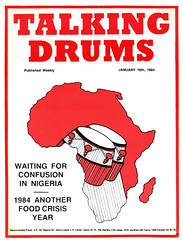No Reprieve for the Dead
Elizabeth Ohene
Those who were responsible for those decisions in 1979 must surely wonder whether any of the six executed then wouldn't have qualified for release today on the grounds of "good conduct" if there had been five, four or three stakes instead of six at Teshie range.The release of six AFRC convicts by the PNDC marks a very significant step in the changes that have been taking place in the attitudes of Flight Lieutenant J. J. Rawlings and his colleagues since 1979.
Back in 1979 when the AFRC came to power, the most significant characteristic of the regime was the infamous secret trials and very stiff penalties. It will be recalled that eight senior officers of Ghana Armed Forces including three former heads of state were executed by firing squad by the AFRC. The regime was firm in its position of total hostility towards those who had been in power and whom they adjudged to have been corrupt.
Prison terms were at first rejected as good enough punishments for fear that a subsequent regime might give those convicted by the AFRC their freedom. 'Let us kill them and it will be impossible for our actions to be reversed in the future' was the reasoning. It took a lot of tortuous pleading by many people to convince the AFRC that the executions must stop and the guarantee extracted for this was regarded by many as particularly high price.
It was written into the constitution handed to the incoming civilian administration that AFRC decisions could not be altered in any way in the future - neither by an act of Presidential executive clemency, nor by Parliament nor indeed even by the courts of the land. In the atmosphere of fear that had been generated by the executions and the violence of the AFRC, many thought any price was worth paying to restore constitutional rule.
However once constitutional rule was in place, the inevitable court cases challenging the AFRC cases started coming before the courts and as soon as bail was given, the AFRC convicts took no chances and quickly made their way out of Ghana to the anger of the former AFRC members and embarrassment of the Limann administration.
This was one of the sore points for Flt-Lt. Rawlings when he seized power the second time and accused the civilian regime of 'reversing the gains of the 4th June Revolution.' The courts came in for particular roasting at his hands and it was not lost on anybody that the three High Court judges that were abducted and murdered in June 1982 were the judges that had dealt with the AFRC cases and in some cases reversed the AFRC courts verdicts.
Now that the PNDC has found it right to release some AFRC convicts for whatever right and justified reasons, there is no doubt that people will wonder at the necessity of the past violence at all.
It was said in 1979 that Col. Takyi who has now been released, was given the last rites and readied for execution with the second and as it turned out, final batch, and escaped from death only because it was realised at the last moment that there were only six stakes at the firing range and there were seven people to be executed. Those who were responsible for those decisions in 1979 must surely wonder whether any of the six executed then wouldn't have qualified for release today on grounds of 'good conduct' if there had been five, four or three stakes instead of six at Teshie range.
The judges who were killed because they dared to say that AFRC decisions are subject to review, how can their lives ever be restored?
Flt-Lt. Rawlings is definitely not saying that he was wrong in 1979 but since he has altered, changed, reversed decisions that he swore then that nobody can, should ever touch but on penalty of death, where did he get the authority from?
What has he got to say to the families of those who were killed then? Since he has currently set up courts again from whose decisions there are no appeals, will the people of Ghana have to wait until his third coming to be able to release those in jail now?
Recalling the 'crimes' that people like Col Takyi, Capt. G. N. Kyeremeh, Col. Jackson and Maj-Gen. Osei Boateng were accused and found guilty of, it is obvious that the PNDC now accepts that human beings can reform, given the opportunity or that time tends to put a different hue on things or that having themselves been in similar positions, they have found the same temptations and succumbed to them? Could it be why these lives are now worth preserving?
